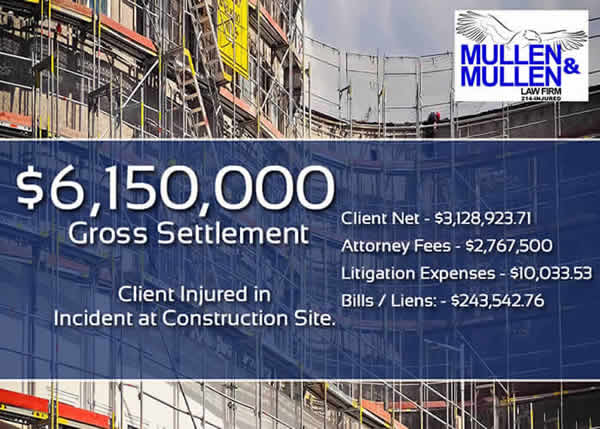
ABOUT WORK INJURY CASES
Are You Dealing With A Worker’s Compensation Or Personal Injury Claim?
Worker’s compensation and personal injury claims operate differently, but in both cases, you have the right to hold your employer accountable for injuries sustained at work.
Interestingly, Texas stands as the only state in the entire United States that doesn’t mandate companies above a certain size to carry worker’s compensation. While this may seem unusual, it presents an advantage: recovering financial compensation is typically easier from companies that don’t subscribe to Texas Workers’ Compensation. Legal defenses available to “subscribers” are often inaccessible to “non-subscribers,” as the Texas legal system incentivizes employers to provide Workers’ Compensation to their employees.
Despite approximately 81% of Texas employees being covered, there remains a substantial portion without coverage. Unfortunately, the workers’ compensation system in Texas tends to favor businesses over workers.
Here’s a guide to help you determine whether you have a worker’s comp or personal injury claim:
Verify Workplace Subscription To Worker’s Comp
Determining your employer’s subscription status can be challenging. Some employers may appear to have workers’ compensation when they only have insurance resembling it. Contact the Texas Department of Insurance Division of Workers’ Compensation to officially establish your employer’s status as a subscriber or non-subscriber to “true” Texas workers’ compensation.
If They Are A Subscriber
If your employer is a subscriber, you are limited to filing a worker’s compensation claim. Filing a personal injury claim against your employer is not an option unless there was gross negligence leading to the worker’s death. If a third party is responsible for your injuries, you can still file a workers’ compensation claim and retain the right to file a third-party action against the at-fault party.
Challenges With Worker’s Comp
Worker’s compensation benefits may not be sufficient to cover actual damages, and the process can involve numerous hurdles. However, if a third party, like a manufacturer of defective equipment, is involved, you can file a personal injury claim against them while also pursuing a worker’s comp claim.
If Your Employer Doesn’t Have Worker’s Comp
In the case of a non-subscriber employer negligently causing your injuries, you have a personal injury claim against them. This situation can be advantageous as non-subscribers lose many legal defenses that would otherwise be available.
Take Swift Action – Promptness Is Crucial In Work Accident Claims!
Acting swiftly is imperative. Jurors are inclined to believe that honest individuals take prompt action, making it easier to convince them of the validity of your case when you promptly file your injury claim. Additionally, crucial evidence needed to support your claim may be lost or destroyed the longer you delay. If you’ve suffered a workplace injury, act promptly to safeguard your rights. Contact Mullen & Mullen today!
With 40 years of experience, our attorneys have successfully secured compensation for Texans injured on the job.
If you’ve sustained a workplace injury in Texas, our Plano work accident attorneys may be able to help you recover damages. For over four decades, Mullen & Mullen Law Firm has been assisting Texans injured at work.
Mullen & Mullen Law Firm can likely aid in recovering damages if your injury resulted from your employer’s (or a co-worker’s) negligence and the company does not subscribe to benefits.
Moreover, if a third party, other than your employer (or a co-worker), is responsible for your injuries, we can assist you irrespective of whether your employer subscribes to benefits. Additionally, if your loved one’s workplace death resulted from gross negligence, we can help, even if the employer is/was a subscriber.
Contrary to common misconceptions, you can file a work accident claim in Texas under certain circumstances, even if the injury occurred during the course and scope of your employment. For instance:
- Our attorneys can assist if a loved one’s workplace fatality resulted from the gross negligence of their employer, regardless of the employer’s subscription to the Texas Workers’ Compensation Act.
- We can also help if your injuries at work resulted from the negligence of a person or company other than your employer, even if your employer subscribes to benefits.
- Our attorneys are available to assist if your injuries at work resulted from the negligence of your employer or co-worker, provided the company is a non-subscriber to benefits.
Determining your eligibility to file a claim against your current or former employer involves a comprehensive examination of various factors. For additional information on on-the-job injuries and the possibility of filing a claim, click any link below to navigate to that section or simply call us now for a free consultation and valuable advice at (972) 947-3370.
THE IMPACT OF SUBSCRIBER VS. NON-SUBSCRIBER WORK ACCIDENT CLAIMS
Can You Pursue A Claim If The Company Provides Workers’ Compensation Benefits, And Your On-The-Job Injury Resulted From Negligence?
Likely not. If your employer offers Workers’ Compensation benefits, they are classified as a “Subscriber” to the Texas Workers’ Compensation Act. In most cases where the company is a Subscriber and negligence by the company or a co-worker is involved, your primary legal recourse is to file a Texas Workers’ Compensation claim.
Remember: You can still file a wrongful death case against your loved one’s workplace, even if they are a “Subscriber,” if the fatality resulted from the company’s gross negligence.
Also, remember: If you were injured on the job or during the course and scope of your employment, but your injuries were caused by the negligence of a third party (not your employer or a co-worker), you can file a work accident claim against the third party, even if your employer is a subscriber to the Texas Workers’ Compensation Act.
Can You File A Claim If The Company Does Not Provide Workers’ Compensation Benefits, And Your On-The-Job Injury Resulted From Negligence?
Probably so. If the company does not offer Workers’ Compensation benefits, they are considered a “Non-Subscriber” to the Texas Workers’ Compensation Act, and you generally have the right to file a work accident claim against them.
Remember: If your employer is a Non-Subscriber to the Texas Workers’ Compensation Act, you must still establish that the company or a co-worker was negligent in causing your injuries. Winning is not automatic; you need to demonstrate wrongdoing by your employer or co-worker.
Also, remember: Texas encourages companies to provide Workers’ Compensation benefits to employees. Therefore, if a company is a Non-Subscriber to the Texas Workers’ Compensation Act, they are penalized by being denied certain common law defenses they would typically be allowed to assert, including:
Assumption Of The Risk:
The company cannot claim that you assumed the risk of injury or death associated with your employment.
Contributory Negligence:
If your employer is a Non-Subscriber, they cannot argue that you were guilty of comparative negligence. However, they can assert that you were solely responsible for your injuries.
Fellow Servant:
In cases where the company is a Non-subscriber to the Texas Workers’ Compensation Act, they are unable to use the defense that your injury or death resulted from the negligence of a co-worker.
How Can Our Attorneys Assist You?
Mullen & Mullen Law Firm has provided representation for numerous clients who sustained injuries on the job in situations where their employers did not provide Workers’ Compensation coverage. Our attorneys possess well-trained accident investigators with expertise in establishing the necessary evidence to build and win your case. If required, we are not hesitant to engage Certified Safety Experts and OSHA Experts to establish liability against your employer. Cases of this nature demand strategic thinking, and Mullen & Mullen is dedicated to providing you with the advantage you need.
Are There Scenarios Where The Company’s Subscriber Or Non-Subscriber Status Doesn’t Impact Your Claim?
Yes. For instance, if you were injured at work or during the course and scope of your employment, but your injuries were caused by someone other than your employer or co-worker, you are always free to pursue personal injury damages against the negligent third party.
Remember: If your loved one suffered a fatal workplace incident due to the gross negligence of their employer, you can pursue a personal injury case against the employer, regardless of whether they are a Subscriber or Non-Subscriber to the Texas Workers’ Compensation Act.
What Are Some Examples Illustrating The Impact Of Subscriber Vs. Non-Subscriber Status On Your Claim?
Consider the examples below to gain insight into how your employer’s classification as a Subscriber or Non-Subscriber may affect your legal rights.
Example 1
You work as a delivery driver for a company that is a Subscriber to the Texas Workers’ Compensation Act. While making a delivery in a company van, you are rear-ended by a negligent driver. You can file a Workers’ Compensation Claim because your injuries occurred during the course and scope of your employment. You are also entitled to file a personal injury claim against the at-fault driver because your injuries resulted from the negligence of a third party.
Example 2
You are employed in a warehouse and operate a forklift for a company that is a Subscriber to the Texas Workers’ Compensation Act. A co-worker, not paying attention, collides with your forklift, causing you to fall and sustain injuries. You can file a Workers’ Compensation Claim because your injuries occurred during the course and scope of your employment. However, you are not entitled to file a personal injury claim as your injuries resulted from the negligence of your employer and/or co-worker.
Example 3
Assuming similar facts to the above example but with the company being a Non-Subscriber to the Texas Workers’ Compensation Act. Since your employer does not provide Workers’ Compensation benefits, you ARE entitled to file a personal injury claim against the company for the negligent actions of your co-worker and/or the negligent actions of the company itself.
NEGLIGENT THIRD-PARTIES IN WORKPLACE INJURY CLAIMS
If Your Workplace Provides Workers’ Compensation Benefits, Can You Still Initiate A Personal Injury Lawsuit Against A Negligent Third Party Responsible For Your Injuries?
Yes. If the company is a Subscriber and offers Workers’ Compensation benefits, you have the option to pursue BOTH a Workers’ Compensation claim AND a personal injury lawsuit.
Remember: If the company provides Workers’ Compensation benefits, you generally cannot pursue a personal injury lawsuit against your employer or co-worker, even in cases of negligence. However, you can pursue a personal injury lawsuit if your injuries resulted from the actions of a negligent third party.
Example 1
Consider an assembly plant where your workplace provides Workers’ Compensation benefits. If a co-worker, not paying attention, collides with you and causes injuries, you cannot file a personal injury lawsuit against your employer. However, if a UPS employee enters the plant to deliver a package and collides with you due to negligence, you CAN pursue a personal injury lawsuit because the UPS employee is a negligent third party.
Example 2
Imagine working for Best Buy’s Geek Squad, and Best Buy offers Workers’ Compensation benefits. While driving to an installation, another driver runs a red light and T-bones your VW Beetle. You can file a Workers’ Compensation claim because the injury occurred in the course and scope of your employment with Best Buy. Additionally, you can file a personal injury lawsuit against the at-fault driver’s liability insurance company.
ESTABLISHING LIABILITY AGAINST AN EMPLOYER IF HURT ON THE JOB
If Your Workplace Lacks Workers’ Compensation Benefits And You Sustain An Injury On The Job, Does This Guarantee An Automatic Victory In Your Personal Injury Case?
No. In the case of a Non-Subscriber employer, you still need to demonstrate negligence on the part of the employer or a co-worker and establish that this negligence directly caused your injuries. In essence, you are still required to prove that your employer or co-worker engaged in wrongful conduct.
Example:
Imagine your employer is a Non-Subscriber and does not provide Workers’ Compensation benefits. Your workplace supplies you with a back brace for lifting heavy items, and your job duties involve lifting at least 50 pounds. While lifting a 15-pound piece of equipment, you experience a freak injury, straining a back muscle. In such a scenario, it is unlikely that the employer would be deemed negligent, as they provided a back brace, and the weight lifted was below the specified maximum.
How Do You Establish Liability Against The Employer?
Establishing liability against your employer can be achieved through various methods. To succeed in your case, you must demonstrate that your employer was negligent, meaning they failed to act as a reasonably prudent company would under similar circumstances. You need to show that your employer’s actions or lack thereof led to your injury.
What Are Some Scenarios In Which Your Workplace Might Be Negligent For Your Injuries?
Keep in mind that injuries can occur in numerous ways, and various factors may contribute to them. The examples provided below are not exhaustive. If you have any uncertainties about whether your employer’s conduct or lack of action played a role in your injuries, seek a free consultation from a personal injury lawyer as soon as possible.
Examples:
Negligent Supervision:
Your employer may be liable if your injuries result from negligent supervision of your co-workers or inadequate supervision, such as being left alone and unsupervised while learning a new skill like welding.
Negligent Training:
Your employer may be liable if inadequate training, whether for you or a co-worker, contributes to your injuries.
Not Providing Proper Equipment:
If your job requires regular lifting of 50 pounds, and your employer fails to provide a necessary weight belt, you can argue that the workplace was negligent for not supplying proper safety equipment.
Not Implementing or Enforcing Policies and Procedures:
Your employer could be liable if they fail to establish or enforce proper policies and procedures in the workplace.
Not Warning of Known Dangers:
If your employer is aware of dangerous activities or areas on the premises and fails to warn you, they could be held liable, among other possibilities.
ABOUT CLAIMS INVOLVING DEATH AND GROSS NEGLIGENCE
Can Your Family Pursue A Wrongful Death Action If Your Loved One Was Killed Due To Their Employer’s Gross Negligence?
Certainly. Whether your loved one’s employer is a Subscriber or Non-Subscriber, your family has the right to bring forth a personal injury claim against the employer.
Keep in mind: If your loved one was killed at work due to the ordinary negligence of a subscribing employer, the exclusive remedy would be through the workers’ compensation system.
How Can Our Attorneys Assist?
Our legal team is committed to investing the necessary resources to secure experts who can substantiate claims of gross negligence, enabling the potential recovery of punitive damages.
In Cases Where Your Loved One Sustained Catastrophic Injuries Due To Their Workplace’s Gross Negligence, Are Punitive Damages Potentially Recoverable?
No. Punitive damages are only attainable if the employer was grossly negligent and the injuries suffered by your loved one resulted in death.
MULTI-EMPLOYER WORK SITES
What Defines A Multi-Employer Work Site?
A multi-employer work site, commonly seen in construction projects, involves multiple companies with their employees working concurrently at the same site. For instance, a general contractor may hire sub-contractors like electricians, plumbers, roof experts, flooring experts, etc.
Keep in mind: If you were injured due to a co-worker’s negligence, and your employer is a Subscriber, filing a Workers’ Compensation claim is likely your exclusive remedy for the sustained injuries. However, if you were on the work site as an employee of ABC Electricians and suffered injuries due to the negligence of an employee of NOP Flooring, you would be eligible to file both a Workers’ Compensation claim and a personal injury claim against NOP Flooring since a negligent third party was responsible for your injuries.
Additionally, remember: The general contractor or the entity that owns the work site could be held liable if they neglected proper supervision of the work site.
GETTING MEDICAL TREATMENT FOR WORK-RELATED INJURIES
If You’ve Been Injured At Work, Are You Eligible For Necessary Medical Treatment?
Possibly. If your employer subscribes to benefits, you are likely to receive some medical treatment. However, it’s essential to note that many employers direct injured workers to medical providers that may hasten their return to work. If your employer doesn’t provide Workers’ Compensation benefits, they may guide you to a preferred medical provider, often with the goal of minimizing their liability.
Remember: Employers often recommend specific clinics for a reason – these clinics tend to be pro-employer and may encourage a swift return to work after a limited number of therapy sessions.
How Can Our Attorneys Assist?
Our Plano work accident attorneys have established a robust network of medical providers dedicated to serving injured workers. These providers prioritize your health and will not release you back to work unless it is safe to do so. Our network includes various professionals such as medical doctors, surgeons, chiropractors, physical therapists, MRI facilities, neurologists, surgical clinics, hospitals, counselors, and more.
What Is The Cost Of All This Medical Treatment?
Dealing with mounting medical bills after a work injury can be challenging. We collaborate with medical providers who agree to postpone billing until the conclusion of your work accident claim. This ensures that you incur no initial out-of-pocket expenses for quality care, allowing you to focus on recovery and getting back to work to support your family.
Should You Avoid Seeing The Workers’ Compensation Doctors?
Generally no. In many cases, you may have the right to file both a Workers’ Compensation claim AND a personal injury claim. It is usually recommended to follow your employer’s instructions and attend medical appointments, as non-compliance or missed appointments could jeopardize your workers’ compensation claim, making you ineligible for benefits.
QUALIFYING FOR A LAW LOAN
Can You Qualify For A Law Loan To Cover Bills During Your Recovery From Injuries?
Yes, you could. Law loan companies assess the risk of your case to determine whether they are comfortable loaning you funds in exchange for an assignment in the settlement proceeds of your case.
How Can Our Attorneys Help?
Our attorneys are aware that law loan companies often require representation by a lawyer for an injured worker to be eligible for an advance. We have established relationships with major law loan companies, and some of them cap the amount of interest charged to Mullen & Mullen clients.
COMPENSABLE DAMAGES IN WORKPLACE INJURY CLAIMS
What Types Of Damages Could Be Recoverable If Your Workplace Is Not A Subscriber To The Texas Workers’ Compensation Act?
In the event that your employer lacks coverage and you sustain injuries at work due to the negligence of the company or a co-worker, you have the right to seek damages from the company. Potential recoverable damages encompass past and future mental anguish, past and future physical impairment, past and future pain and suffering, loss of past earnings, loss of future earning capacity, recovery of past medical expenses, and any necessary future medical expenses.
Remember: If your work-related injuries were caused by a negligent third party (rather than your workplace or co-worker), you are entitled to the same damages mentioned above.
What Damages May Be Available If The Employer Was Grossly Negligent And The Injured Worker Succumbs To Their Injuries?
Answer: Punitive damages.
WORKERS’ COMPENSATION LIENS
Can The Workers’ Comp Carrier Place A Lien On The Settlement Proceeds From A Negligent Third-Party Responsible For Your Injuries?
Yes, it is likely. The right of the Workers’ Compensation carrier to recover a portion of your third-party settlement is known as the right of subrogation.
Do Workers’ Compensation Carriers Negotiate And Reduce Their Lien Or Accept Less Than The Owed Amount?
Yes, most carriers are willing to reduce their lien, often as a courtesy or obligation (e.g., reducing the lien by 1/3 if you have legal representation and they do not). While not mandatory, carriers may agree to a reduction to secure at least a partial recovery.
How Can Our Attorneys Assist?
Our team specializes in negotiating down Workers’ Compensation liens, ensuring our clients retain more of their settlement. Our Plano work accident attorneys routinely engage with major subrogation recovery organizations.
What Reduction Can You Expect If Your Injuries Resulted From A Negligent Third Party, And The Workers’ Compensation Carrier Does Not Hire Its Own Counsel To Pursue Damages Against The At-Fault Party?
Typically, you may be entitled to a 1/3 reduction in the workers’ compensation lien amount. For instance, if the carrier paid $150,000 in indemnity expenses, they might agree to reduce their lien to $100,000.
What If Your Employer Terminates You After A Workplace Injury?
Terminated abruptly following a work injury? Here’s what to do if you suspect your employer fired you due to your on-the-job injury.
It’s a distressing situation: you sustain a job-related injury, and shortly afterward, you are terminated under mysterious circumstances.
Being fired due to a workplace injury is unacceptable and may constitute “retaliatory discharge,” leading to legal action against the company.
Employers cannot terminate you for an on-the-job injury. If they claim otherwise, it could be considered retaliatory discharge, providing grounds for a lawsuit.
However, employers can circumvent this by citing performance issues or financial difficulties if you are an “at-will” employee.
A proficient personal injury attorney can help you find an employment law attorney if you experience retaliatory discharge.
Our Plano work injury attorneys offer free consultations to discuss your case, and you only pay if we secure a win. The worst-case scenario is discovering you don’t have a viable claim.
CONTACT US FOR A FREE CONSULTATION
Call (972) 947-3370 to talk to a Plano work accident attorney right now. We won’t put any pressure on you to hire us on the spot. Simply learn how we’ll approach your case and get some excellent free advice. Make your decision only when you feel 100% ready. Do remember though, that the Texas statute of limitations gives you just 2 years from the date of your accident to file a claim.
We’ll come to your home or hospital room if it makes it easier on you! Phone and Zoom consultations are also available. You can call us, or use the form or chat feature on this page to request a free consultation now.
Seriously Hurt? We’ll Come to You!
PLANO OFFICE
Mullen & Mullen Law Firm in Plano0
8105 Rasor Boulevard #237
Plano, TX 75024
Call (972) 947-3370 today!
By Appointment Only










 If you were injured in a work accident, our skilled Plano attorneys fight tenaciously to ensure the maximum available settlement while offering you the lowest contingency fee. We handle your case the way we would want our own case handled.
If you were injured in a work accident, our skilled Plano attorneys fight tenaciously to ensure the maximum available settlement while offering you the lowest contingency fee. We handle your case the way we would want our own case handled.







